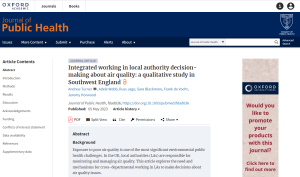Clearways: understanding mechanisms to help councils manage air quality
9 May 2023
Mechanisms that help council staff successfully work together to tackle air quality issues have been revealed in the results of the Clearways study, published in the Journal of Public Health. In interviews carried out by NIHR ARC West researchers, council staff in the southwest of England saw air quality as an issue affecting multiple departments. They also identified mechanisms that helped them work together to tackle it.
Poor air quality is one of the most significant environmental public health challenges. The World Health Organization (WHO) estimates that nearly four million people die each year because of air pollution. It is possible that poor air quality reduces life expectancy and may cause around 30,000 premature deaths each year in the UK.
The Clearways study looked at how the issue of air quality impacted decision-making in seven local councils in the southwest of England. During the project, researchers interviewed staff working in public health, environmental health and transport.
The study team found that interviewees saw air quality as an issue affecting multiple departments within a local council. For example, environmental health teams were responsible for regulatory compliance, while changes made by transport teams often had the biggest impact.
When addressing air quality issues, interviewees found the following helpful:
- National and local policies committed to improving air quality
- Dedicated air quality groups, bringing together key people from different areas of the council
- Other groups within councils that could raise air quality issues, for example, using forums such as health protection groups, health and wellbeing boards and political committees
- Time and resources for staff to build and maintain good working relationships with other parts of the council
The study team found that the above mechanisms helped environmental health staff implement measures aimed at complying with pollution limits. They also helped public health staff get issues of air quality recognised as a wider health issue.
Dr Andrew Turner, NIHR ARC West and the Centre for Academic Primary Care (CAPC) at the University of Bristol, a lead author of the study, said:
“Air quality is an important health issue that different teams within local councils need to consider when they make decisions.
“We have found examples of how councils can successfully bring together the different sources of expertise they have to get air quality onto the agenda.”
Paper
